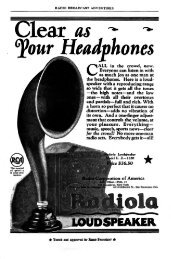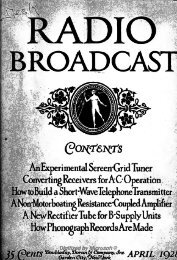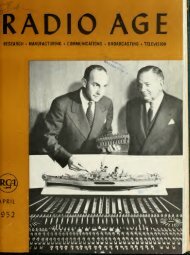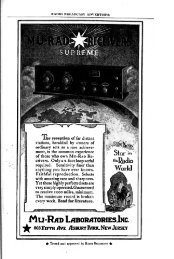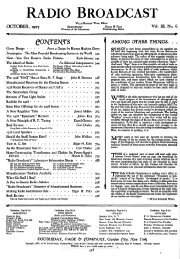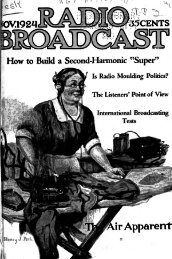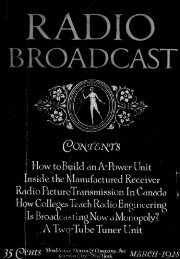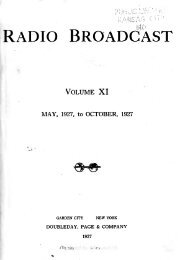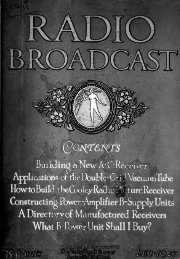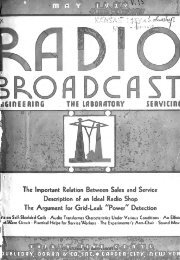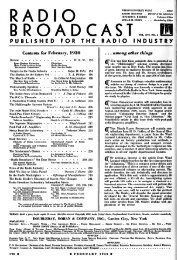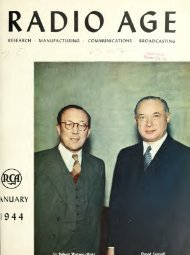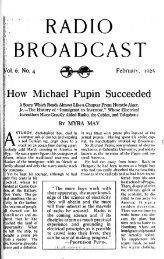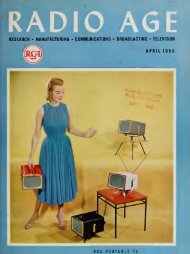Radio Age - 1955, April - 36 Pages, 2.8 MB, .PDF - VacuumTubeEra
Radio Age - 1955, April - 36 Pages, 2.8 MB, .PDF - VacuumTubeEra
Radio Age - 1955, April - 36 Pages, 2.8 MB, .PDF - VacuumTubeEra
Create successful ePaper yourself
Turn your PDF publications into a flip-book with our unique Google optimized e-Paper software.
Anti Trust Suit<br />
(Continued from page 13)<br />
electronic equipment without the patents of a number of<br />
different companies, the answer pointed out.<br />
"The purpose and effect of these cross-licenses were<br />
to free the industry," RCA said. "Without them the<br />
industry would have been paralyzed by conflicting patent<br />
holdings and endless patent litigation. With these crosslicenses<br />
the industry was freed and enabled to develop<br />
rapidly."<br />
The situation created by these cross-licenses was the<br />
subject of a Government proceeding in 1930, which resulted<br />
in a consent decree, under which General Electric<br />
Company, American Telephone and Telegraph Company<br />
and Westinghouse Electric & Manufacturing Company<br />
disposed of their stock in RCA and new cross-licensing<br />
agreements were drawn up, the Corporation said.<br />
This consent decree and the new cross-licensing<br />
agreements which were reaffirmed by the courts in 1942,<br />
RCA said, represented the considered and correct judgment<br />
of the Government that this was the best way to<br />
achieve continued growth of a competitive radio-television<br />
industry free from restraint. It was pointed out<br />
that as recently as 1954, on a motion to construe the<br />
decree, the court reasserted the fact that the cross-license<br />
agreements were approved by the consent decree.<br />
"That the cross-license agreements approved by the<br />
consent decree have had the effect intended and expected<br />
by the Government is fully borne out by the dynamic<br />
growth of the industry," RCA continued.<br />
"These agreements expired by their terms on December<br />
31, 1954, so far as new inventions are concerned.<br />
Yet the complaint filed only six weeks before this expiration<br />
is an attack on these very agreements which<br />
were recommended and stated to be in the public interest<br />
by the Government in 1932."<br />
RCA said that the issues in this case have already<br />
been adjudicated as a result of the 1942 decision when<br />
the Delaware District Court ruled that "since these consent<br />
decrees are based upon an agreement made by the<br />
Attorney General which is binding upon the Government<br />
the defendants are entitled to set them up as a bar<br />
to any attempt by the Government to relitigate the issues<br />
raised in the suit." The answer added:<br />
"RCA avers that the Government cannot attack a<br />
consent decree to which it is a party by charging RCA<br />
with violating the law—beginning the very day after the<br />
decree was entered—because it has conformed ro the<br />
provisions of the decree. The consent decree of 1932,<br />
and the cross-license agreements approved thereby, represent<br />
the considered and correct judgment of the Government<br />
and the court, as well as of the defendants, that<br />
this was the best way to achieve the objectives of the<br />
Government's petition, namely, the continued growth of<br />
a competitive radio-television industry free from restraint.<br />
The correctness of this judgment and the intensely<br />
competitive industry which has resulted from the<br />
policies and practices of RCA under and pursuant to this<br />
decree is shown by the soaring sales of radio and television<br />
receivers since 1932.<br />
"RCA's policy of licensing its competitors and others<br />
on reasonable and non-discriminatory terms and without<br />
restriction has been a major factor in the rapid growth<br />
of the electronics industry, including the radio-television<br />
industry."<br />
Many Companies Engaged in Research<br />
Stating that research activities play an important part<br />
in the development of radio and television products,<br />
RCA said that it has been a pioneer in the research and<br />
development of radio receivers, black-and-white and<br />
color television receivers and various other radio and<br />
television products and devices which have vital significance<br />
for the national defense. No other organization,<br />
it was declared, has contributed as much to the research<br />
and development of these products and devices as RCA,<br />
and RCA's patent licensing policies have enabled its<br />
competitors and others to enjoy the fruits of RCA's<br />
research and development on reasonable and non-discriminatory<br />
terms and without restriction.<br />
RCA said, however, that the research and development<br />
which it conducts in electronics is but a small part<br />
of the total research in this industry conducted in the<br />
United States, and that many companies not formerly in<br />
electronics are now intensively active in the field.<br />
Listing many substantial competitors with large resources<br />
for research and development that exist in the<br />
radio-television industry, RCA said:<br />
"These include the Admiral Corporation, Columbia<br />
Broadcasting System, Inc., Allen B. Du Mont Laboratories,<br />
Inc., Emerson <strong>Radio</strong> & Phonograph Corporation,<br />
General Electric Company, International Telephone and<br />
Telegraph Corporation, Motorola, Inc., Philco Corporation,<br />
Raytheon Manufacturing Company, Sylvania Electric<br />
Products, Inc., Westinghouse Electric Corporation,<br />
Zenith <strong>Radio</strong> Corporation, and others. The published<br />
sales figures of the companies named alone, for the most<br />
recent annual period, exceed two billion dollars. Each<br />
of these companies maintains extensive facilities for its<br />
own research and development.<br />
Each of these companies<br />
has every incentive to follow and has followed a program<br />
of intense and active research and development to produce<br />
better products in this highly competitive market<br />
as well as to license others."<br />
30 RADIO AGE



